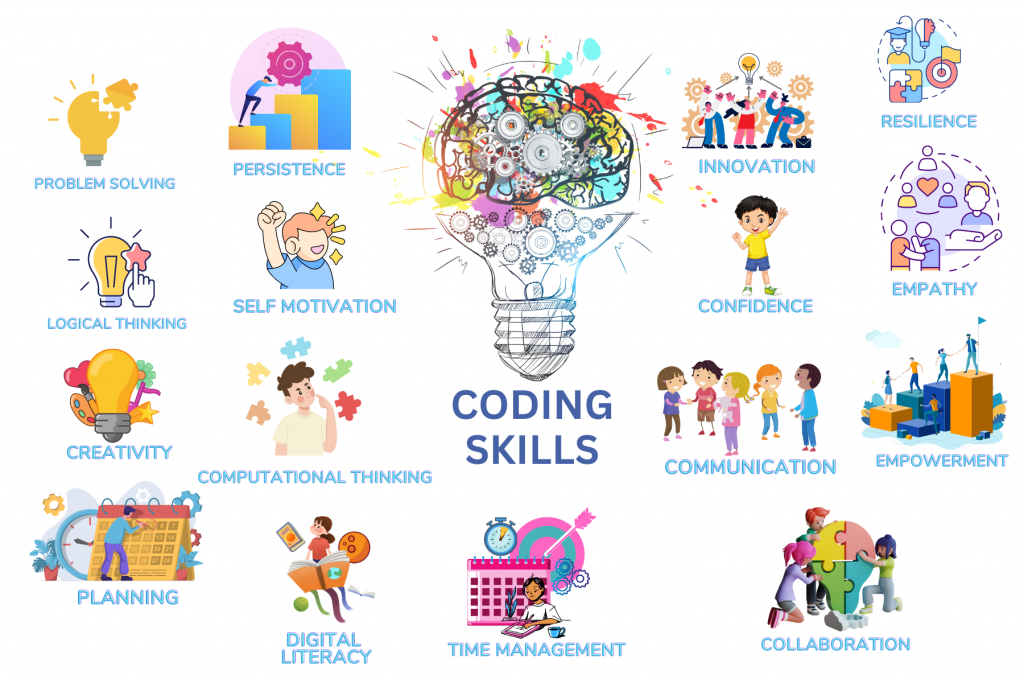In today’s digital age, coding has become an essential skill for the workforce of the future. As technology advances and shapes our world, the demand for individuals with coding skills is skyrocketing across various industries. And what better way to prepare the next generation for this tech-driven future than by introducing them to coding at an early age?
Coding education for kids – is a trend that is taking the education world by storm. Not only does learning to code help children develop 21st century skills, but it also opens up a whole new world of career opportunities. In this article, we’ll explore why coding for kids is becoming increasingly popular and how it can pave the way for a bright future in the tech industry. So, if you’re a parent, educator, or simply curious about the world of coding, read on to discover the benefits of this valuable skill for kids.
Related reading
● 21st Century Skills | The Compelling Necessity
● Unlock the Digital World: Why Kids Need Digital Literacy Now!
Why Coding is Important for Kids ?
Coding is quickly becoming a vital literacy skill that is essential for success in today’s world. Just like reading and writing, learning to code can help children develop their cognitive abilities, enhance their problem-solving skills, and foster creativity. Moreover, coding can help kids better understand complex topics such as math and science and prepare them for the digital world that is becoming increasingly intertwined with everyday life.
Not only does learning to code provide kids with valuable skills for the future, but it also opens up numerous career opportunities in the growing technology industry.
Here are some reasons why coding for kids is the future of education and career opportunities:
- Coding is a valuable skill for the future: In today’s digital world, technology is advancing at an unprecedented rate, and coding is a skill that will only become more in demand in the future. Learning to code at an early age will provide kids with valuable skills that they can use throughout their lives.
- Growing demand for technology professionals: The technology industry is growing rapidly, and there is a high demand for skilled professionals in this field. By learning to code at an early age, kids can prepare themselves for a career in this exciting and growing industry.
- Entrepreneurship opportunities: Learning to code can also open up opportunities for kids to become entrepreneurs. With their coding skills, they can create their own apps or websites, and start their own businesses.
By learning to code at an early age, kids can develop valuable skills that they can use throughout their lives, and prepare themselves for a career in the growing technology industry.
Benefits of Coding for Kids
Coding for kids comes with a wide range of benefits, from developing problem-solving skills to fostering creativity. Here are some of the most important benefits of coding for kids:
- Boosts creativity and problem-solving skills: Coding is a creative process that requires the use of logical thinking and problem-solving skills. Children learn to approach problems in a systematic way and develop the ability to break down complex problems into smaller, more manageable parts.
- Enhances critical thinking and analytical skills: Coding helps children develop critical thinking and analytical skills by encouraging them to analyse problems and think logically about solutions.
- Improves math and language skills: Coding involves math and language skills, and as children learn to code, they improve their abilities in these subjects.
- Prepares for the future: In today’s digital age, coding is becoming an essential skill, and children who learn to code will be better equipped for future job opportunities.
- Promotes teamwork and collaboration: Coding often involves teamwork and collaboration, which helps children develop social skills and the ability to work with others.
- Fosters resilience and perseverance: Coding requires a lot of trial and error, and children learn to persevere through challenges and setbacks, fostering resilience and a growth mind-set.
- Sparks an interest in technology: Coding introduces children to the world of technology and can inspire a lifelong interest in this field.

- Digital literacy: As technology becomes increasingly prevalent in our daily lives, it is essential for students to develop digital literacy skills. Coding education provides students with the skills needed to navigate and understand technology.
- Persistence: Coding often involves trial and error and requires persistence to overcome challenges and solve problems. This can help develop resilience and persistence skills in students.
- Communication: Coding often involves communicating ideas and concepts to others. This helps develop communication skills and the ability to explain complex ideas in a clear and concise way.
- Empathy: Creating technology that is accessible and user-friendly requires empathy for the user’s needs. Coding education can help students develop empathy skills and consider how their projects will impact others.
- Innovation: Coding education encourages students to think outside the box and develop creative solutions to problems. This can help foster innovation skills that can be applied to other areas of life.
- Adaptability: The field of technology is constantly changing, and coding education can help students develop adaptability skills to keep up with these changes.
- Entrepreneurial skills: Learning to code can help students develop an entrepreneurial mind-set by encouraging them to create their own projects and solutions. This can help foster skills such as risk-taking, creativity, and leadership.
- Time management: Coding projects often involve deadlines and time constraints. This can help students develop time management skills and learn to prioritize their work effectively.
- Financial literacy: Learning to code can also help students develop financial literacy skills, as they may be exposed to budgeting and project management concepts.
- Research skills: Coding requires research to understand and implement new technologies and techniques. Students can develop research skills that they can use in other subjects as well.
- Self-motivation: Learning to code can be challenging, but it can also be very rewarding. As students work on coding projects, they develop self-motivation and the ability to persevere through difficult tasks.
These skills are all valuable in their own right and can benefit students in many different areas of their lives. By learning to code, students can develop a diverse range of skills that can help them succeed both academically and professionally.
Related reading:
- Mathematics and Coding: The Perfect Partnership for Problem-Solving and Logical Thinking
- Benefits of Coding Classes for Kids Who Love Programming
- Which Key Skills Develop in Kids While Learning to Code?
- Computational Thinking: A Primer for Parents
The Future of Coding as a Career
The future of coding as a career is bright. Technology is advancing rapidly, creating a growing demand for skilled coders. Artificial intelligence, machine learning, and data science have opened up new opportunities for coders, and the shift towards remote work has made coding an attractive option for those seeking flexibility. The rise of start-ups and entrepreneurship has also created new avenues for coders to create their own businesses and products. As funding and resources for entrepreneurs continue to increase, the potential for growth in this field is immense.
Some examples of industries where coding knowledge can be useful

- Information Technology (IT): This is the most obvious field where coding skills are required. IT companies often hire coders for roles such as software developer, web developer, and database administrator.
- Finance and Banking: Coding is essential for developing software applications used in financial analysis, risk management, and trading. Banks and other financial institutions also use coding to develop and maintain their online banking systems.
- Healthcare: Coding is becoming increasingly important in the healthcare industry. Electronic health records (EHR) are now used in many hospitals and clinics, and coders are needed to develop and maintain these systems. Additionally, medical researchers use coding to analyse data and develop predictive models.
- Manufacturing: Coding is used in the manufacturing industry to automate processes, monitor production, and analyse data.
- Education: Coding is becoming an important part of education, with many schools now offering coding classes and programs. Coders can also develop educational software and applications.
- Government: Many government agencies use coding for data analysis, software development, and cyber security.
- Marketing and Advertising: Coders are needed to develop and maintain websites, mobile applications, and other digital marketing tools.
- Media and Entertainment: Coding is used in the media and entertainment industry to develop video games, animation, and special effects.
These are just a few examples of the many industries where coding knowledge can be useful. As technology continues to advance, coding skills will likely become even more valuable in many other fields as well.
Career opportunities in Coding for Kids
- Software Developer: This is the most common career path for coders. Software developers design, develop, and test software applications, systems, and programs.
- Web Developer: Web developers design, develop, and maintain websites using programming languages such as HTML, CSS, and JavaScript.
- Game Developer: Game developers use coding to design and create video games for various platforms, including consoles, mobile devices, and computers.
- Data Analyst: Data analysts use coding to analyse and interpret data to help businesses make informed decisions.
- Cyber security Specialist: Cyber security specialists use coding to develop and implement security measures to protect computer systems and networks from cyber threats.
- Artificial Intelligence/Machine Learning Engineer: AI/ML engineers use coding to develop and implement artificial intelligence and machine learning algorithms for various applications.
- Mobile App Developer: Mobile app developers use coding to design and create mobile applications for various platforms, including iOS and Android.
- Robotics Engineer: Robotics engineers use coding to design and develop robots for various applications, including manufacturing, healthcare, and space exploration.
These are just a few examples of the many career paths available for kids who learn coding. With the rapid advancement of technology, there are likely to be even more exciting and innovative career opportunities in the future.
Related Reading
Why Learning to Code Early Can Be a Game-Changer for Your Child’s Future Career ?
The demand for skilled coders is set to grow in the future, making coding a promising career choice. Children who develop coding skills early on will be well-positioned to take advantage of this trend, as they will have a head start in developing the knowledge and expertise required to succeed in this field. Learning to code early can have a significant impact on your child’s future career prospects. With the rapid advancement of technology, coding skills have become increasingly valuable across a wide range of industries.

By encouraging your child to learn to code at an early age, you are providing them with a head start in developing the knowledge and expertise required to succeed in this field.
How to Introduce Coding to Kids ?
Introducing coding to kids doesn’t have to be complicated or intimidating. There are various ways to get kids interested in coding, from coding games to coding camps. Here are some suggestions for introducing coding to kids:
There are several effective strategies for introducing coding to kids:
- Start with visual programming languages: Visual programming languages such as Scratch, Blockly, or Code.org are excellent tools for introducing coding to kids. They use blocks of code that can be moved around on the screen, making it easy for kids to understand the basic principles of coding.
- Use Gamification: Gamification can be a great way to get kids excited about coding. Games such as CodeCombat, Code.org’s Minecraft Hour of Code, and Robot Turtles are fun and interactive ways for kids to learn the basics of coding.
- Make it hands-on: Hands-on activities such as building and learning robotics for kids, or creating simple games, can help kids see the real-world applications of coding.
- Encourage experimentation: Encourage kids to experiment and try new things. Let them play around with different coding languages, platforms, and tools to find what they enjoy the most.
- Provide support: Provide kids with resources and support such as online tutorials, coding clubs, and mentorship. This can help them stay motivated and engaged in coding.
- Emphasize problem-solving: Emphasize the problem-solving aspect of coding. Encourage kids to think critically and come up with creative solutions to coding challenges.
Overall, the key is to make coding fun and accessible for kids. By using engaging tools and resources and encouraging experimentation and problem-solving, you can help kids develop a lifelong love for coding.
Related reading
- How to keep kids interested in coding | Parent’s Guide
- Introducing Coding Workshop for Kids: A Fun Way to Get Your Kid Started on Technology
- 10 Best Ways to Learn Computer Programming for Kids
- Discover the 10 Best Coding Books for Kids – Unlock a World of Coding Fun
Coding Goes Beyond Screen Time
As parents and caregivers, it can be easy to worry about the amount of time children spend in front of a screen. However, when it comes to coding, it’s important to remember that the practice involves much more than just staring at a computer screen.

By encouraging children to engage in problem-solving, critical thinking, creativity, and collaboration, parents can help them develop essential skills that go beyond screen time. Additionally, physical computing and real-world applications of coding can help children see the many practical benefits of learning to code. By focusing on these aspects of coding, parents and caregivers can help children appreciate the many opportunities that come with learning to code, while also ensuring a healthy balance between screen time and offline activities.
SkoolOfCode: Building Future Tech Talent in Kids
SkoolOfCode is an excellent resource for children who want to learn to code and prepare for a future career in technology. The platform offers a variety of courses designed to teach kids coding skills in a fun and engaging way. These courses are suitable for children of all ages and skill levels, and they cover a wide range of programming languages, including Scratch, 3D Game Dev, Web Designing, Python, and Java.
SkoolOfCode also provides students with opportunities to apply their coding skills to real-world problems and projects. This hands-on approach to learning helps children develop important problem-solving and critical thinking skills that will benefit them in many areas of their lives.
In addition to teaching technical skills, SkoolOfCode also emphasizes the importance of collaboration and communication. Through group projects and peer-to-peer feedback, children learn how to work effectively with others and communicate their ideas clearly. These soft skills are essential for success in any career, and they are particularly important in the technology industry, where teamwork and communication are key.
Overall, SkoolOfCode provides children with an excellent foundation in coding skills and helps prepare them for a future career in technology. By giving kids the tools and support they need to develop their skills and build their confidence, SkoolOfCode is helping to create the next generation of talented coders and technology professionals.
Conclusion
In today’s digital age, coding education is becoming increasingly important for children. Not only can coding help kids develop essential and fundamental skills, but it can also prepare them for the tech-driven future that lies ahead. With coding skills, children can unlock countless career opportunities and set themselves up for success in the future. So, whether you’re a parent, educator, or simply curious about the world of coding, consider introducing coding to the children in your life. Who knows – you may just inspire the next generation of tech innovators.
Looking to give your child a head start in the 21st century job market? Look no further! Book a trial class with Skoolofcode today and give your child the tools they need to succeed in the exciting and fast-paced world of technology.
Ms.Manpreet Virk, an educator at SkoolOfCode with a degree in M.Phil and Master in Computer Science. She is passionate about learning and teaching young minds.

